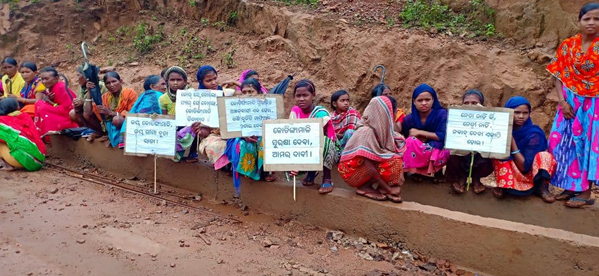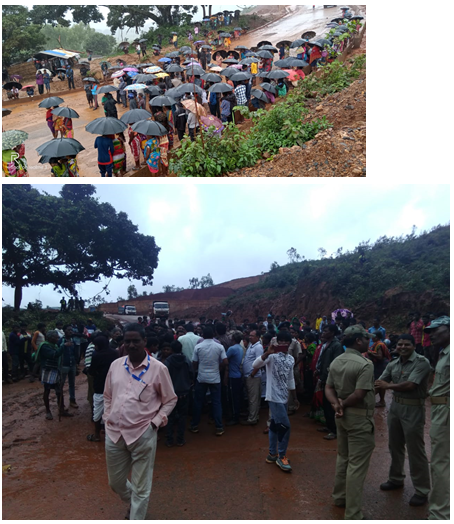Stop Vedanta: Anti-Bauxite Mining Protests in Kodingamali Set Example of Resistance to Corporates

Thousands of tribals are braving the rains in Kodingamali hill in Odisha to stop the bauxite mining by Vedanta group, followed by a fresh hearing of the Gram Sabha. The tribal agitation has gained renewed momentum as an indefinite strike has been launched by the tribals in 22 villages. The villagers are currently blocking the road leading to the mines near Laxmipur which is has led to the suspension of the transport of bauxite from Kodingamali to the Kakrigumma railway station.

These villages, under eight panchayats of three blocks in the district, lie on the fringes of the Kodingamali hill and are worst-affected by the mining activities in the region. The residents are stating that they were tricked to surrender their land in the name of infrastructural development and employment generation. During the previous protests, a petition was also filed in the National Green Tribunal against land acquisition by Prafulla Samantra, activist and Goldman Prize winner, who had stated that the land acquisition by the government violates the Forests Rights Act (2006) as due process was not followed.
Also read: Nalco Challenges Odisha HC's Order Favouring Vedanta
The project had started in February 2018. Soon after obtaining clearances for the Kodingamali bauxite mine, the government of Odisha had introduced a new bauxite linkage policy. The Odisha Mining Corporation signed a Memorandum of Understanding with Indian mining company Vedanta to supply 70% of the bauxite obtained from Kodingamali to Vedanta’s refinery situated about 150 km away at Lanjigarh in Kalahandi district. Vedanta had earlier been importing bauxite from countries like Brazil and Guinea as well as neighbouring states like Chhattisgarh and Andhra Pradesh to feed its 2 million tonnes per annum refinery. In 2017, the Odisha Mining Corporation received forest clearance for developing a new bauxite mine in 435 hectares of forest land in the Kodingamali hill region. Villagers now allege that the mining project had been started against the wishes of the residents of the area and without the consent of the gram sabhas. Moreover, the project and the movement of the trucks is destroying the fields of the locals, with smaller river bodies being polluted from the waste generation of the plant.
Speaking to NewsClick, Rabi Shankar, local journalist and activist said, “The government is trying its best to subvert the movement. The government is pro-corporate. Initially the Aditya Birla Group was supposed to mine in the region. However, despite the acquisition of land, mining work did not commence, post which the OMC took control of the land, almost a decade ago. Amid this, the Vedanta group was trying to pave its way in the region through the Niyamgiri hills. The group appealed to the government for the lease of the mines in Kodingamali region.”
He added that the state is washing off responsibility of the impact of mining on the lives of the tribals. The locals are questioning as to why they should work as guards on their own lands, and those who are raising their voice are being dubbed as “Maoists” and are being repressed. On April 13 last year, a few villagers torched a tipper of the mining company, following which the police arrested five people for allegedly instigating villagers against bauxite mining at Kodingamali hill.
Surya, an activist with the Save Niyamgiri movement, stated, “The villagers have been protesting from the 26th of this month, however, this is not the first time protests have erupted in the region. Villagers have been on the streets ever since the first Aditya Birla project had been proposed in the region. At first the tribals resisted the Hindalco group and now we are resisting Vedanta. The fight against corporate giants is ongoing. The blame for this has to be shared across party lines as both the BJP and the Congress governments in the state have supported Vedanta and its endeavours.”
Attempts are being made by the Biju Janata Dal (BJD) to stall the movement. In Kodingamali, the women who are resisting Vedanta, state government, politicians and panchayat representatives, clashed with a local BJD leader who was urging them to stall the protests. Following this, an Odia demand charter has been sent to the district collector to close the polluted mine at the region.
Previously, the state had witnessed agitation by the Niyamgiri tribes from Odisha, who have been struggling against Vedanta for a long time now to protect their livelihood, raising the slogan, “Polluter and Killer Vedanta, Quit India”. The struggle and campaign of people from Niyamgiri to close the aluminium refinery in ecologically sensitive Niyamgiri, which has been continuing since 2003, gained momentum after the killing of 13 people – who were protesting against the copper smelter Sterlite Industries, a subsidiary of Vedanta.
Also read: ‘We Will Die For Niyamgiri’: Tribes of Niyamgiri Protest Against Vedanta in Odisha
*This is a developing story
Get the latest reports & analysis with people's perspective on Protests, movements & deep analytical videos, discussions of the current affairs in your Telegram app. Subscribe to NewsClick's Telegram channel & get Real-Time updates on stories, as they get published on our website.
























